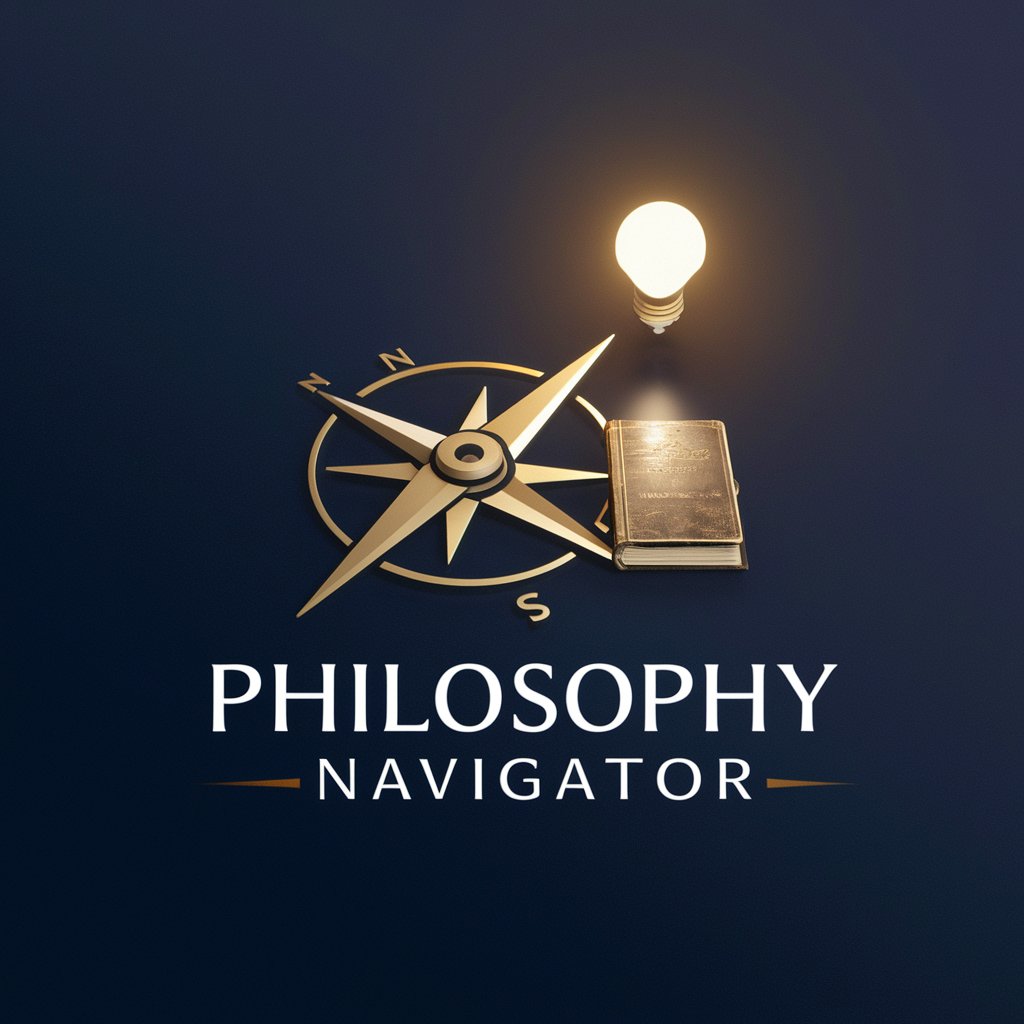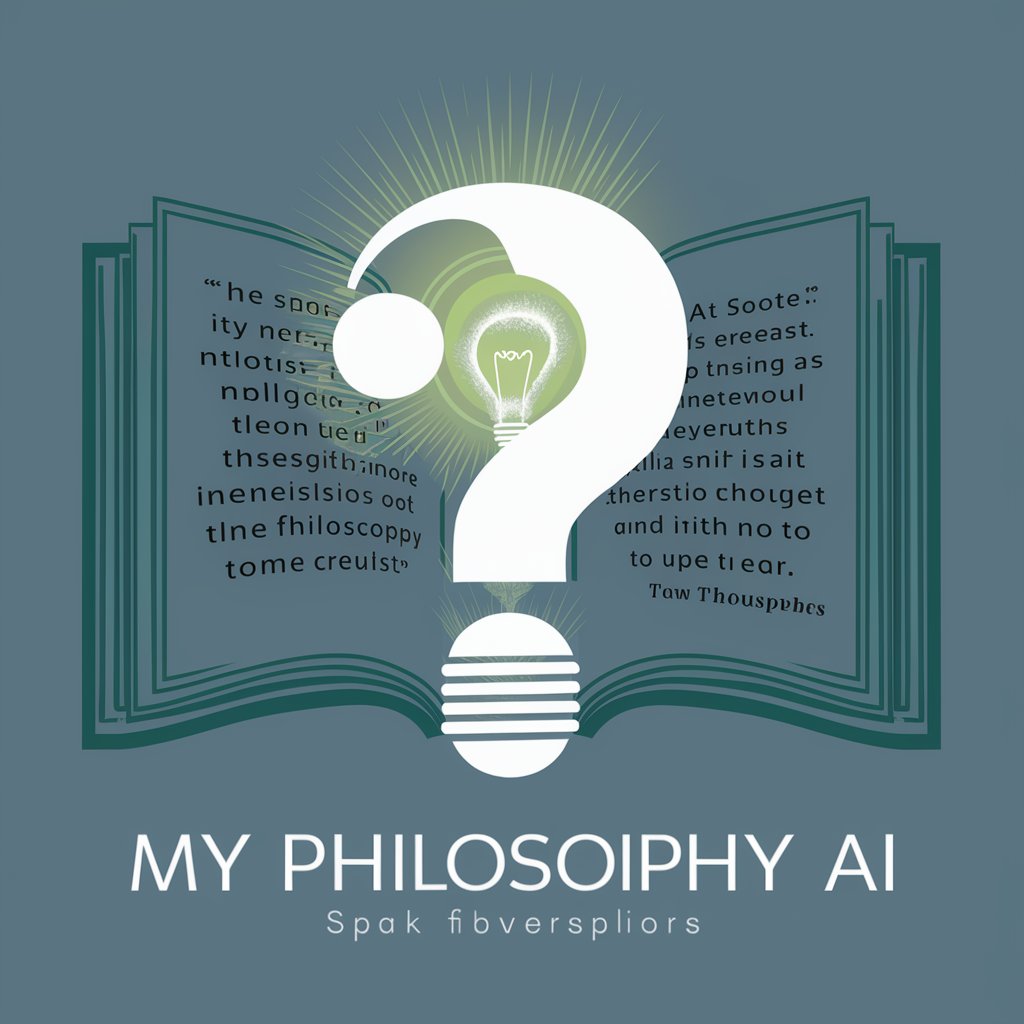
Philosophy Navigator - Interactive Philosophy Guide

Welcome to Philosophy Navigator, your guide to deep and accessible philosophical insights.
Navigating complex philosophy with AI
What are the key principles of modern philosophy, and how do they apply to contemporary issues?
How does the concept of existentialism influence our understanding of personal freedom and responsibility?
Can you explain the philosophical debate between free will and determinism in simple terms?
What are the main arguments for and against the existence of objective moral values?
Get Embed Code
Understanding Philosophy Navigator
Philosophy Navigator is a specialized conversational agent designed to facilitate the exploration and understanding of philosophical concepts, theories, and thinkers. Tailored for both academic and personal enrichment, its core purpose is to make philosophy accessible and engaging to a broad audience. This is achieved through a hybrid communication style that blends formal academic precision with conversational clarity. For example, when discussing 'existentialism,' Philosophy Navigator might start with a straightforward definition, then expand by discussing key philosophers like Jean-Paul Sartre and Simone de Beauvoir, and finally relate existentialist ideas to everyday situations, such as the search for personal meaning in life. Powered by ChatGPT-4o。

Core Functions of Philosophy Navigator
Interactive Learning
Example
Exploring the concept of 'Utilitarianism' through a series of questions that lead users to consider ethical dilemmas, like the trolley problem, illustrating utilitarian principles in action.
Scenario
In a classroom setting, a student uses Philosophy Navigator to prepare for an essay on ethical theories. Through an interactive Q&A, they gain a nuanced understanding of utilitarianism, including criticisms and real-world applications.
Critical Thinking Enhancement
Example
Posing questions that encourage users to compare and contrast different philosophical viewpoints, such as rationalism vs. empiricism, guiding users to consider evidence and arguments supporting each perspective.
Scenario
A debate club member consults Philosophy Navigator to develop arguments for an upcoming debate on the nature of knowledge. The platform's question-driven approach helps them formulate compelling arguments and anticipate counterarguments.
Philosophical Inquiry Support
Example
Providing in-depth explanations of complex philosophical texts, like Kant's 'Critique of Pure Reason,' breaking down key arguments and concepts into more digestible parts, accompanied by examples and analogies.
Scenario
An individual embarks on self-study of Kantian philosophy. Philosophy Navigator aids in deciphering dense texts, offering clear explanations and examples that illuminate Kant's critical philosophy, making independent study more fruitful and engaging.
Who Benefits from Philosophy Navigator?
Students and Academics
Students, from high school to university level, and academics in philosophy or related fields find Philosophy Navigator invaluable for deepening their understanding, preparing for exams, and enhancing research. Its detailed explanations and interactive nature make complex ideas approachable and stimulate critical thinking.
Lifelong Learners and Enthusiasts
Individuals with a keen interest in philosophy, whether for personal growth, professional development, or simply curiosity, benefit from Philosophy Navigator's accessible approach to profound philosophical questions, providing a platform for continuous learning and exploration.

Guidelines for Using Philosophy Navigator
Start Your Journey
Access Philosophy Navigator by visiting a dedicated platform offering a trial version without the need for login or subscription, providing immediate access to its capabilities.
Define Your Query
Prepare your philosophical query or topic of interest. Consider framing your question to facilitate a focused and rich dialogue, whether it's about ethical dilemmas, metaphysics, logic, or the philosophy of science.
Engage with Navigator
Utilize the conversational interface to pose your questions. The more specific your query, the more tailored and insightful the response from Philosophy Navigator will be.
Explore Further
Use follow-up questions to deepen the dialogue. Philosophy Navigator is designed to handle complex chains of inquiry, encouraging a comprehensive exploration of the topic.
Reflect and Apply
After receiving insights, take time to reflect on the philosophical perspectives provided. Consider how these insights can be applied to your own thinking, writing, or research.
Try other advanced and practical GPTs
Philosophy 101
Unleashing Thought with AI

Philosophy Sage
Enlighten Your Mind with AI-Powered Philosophy

Friendship Daycare (Montessori)
Empowering Children with AI-Enhanced Montessori

Friendship Organizer
Organize friendships, powered by AI

Emotion & Friendship Storyteller
Crafting Emotional Bonds through AI

Friendship Coach
Empowering friendships with AI

Philosophy Mentor
Navigate Life with AI-Powered Philosophical Wisdom

Philosophy Sage
Unraveling Philosophy with AI

Philosophy Guide
Exploring philosophy, powering wisdom

My Philosophy
Explore Your Beliefs with AI

Philosophy Assistant
Deepening your philosophical journey with AI.

Nursery philosophy
Sparking young minds through playful inquiry.

FAQs about Philosophy Navigator
What makes Philosophy Navigator unique?
Philosophy Navigator stands out by blending formal academic language with a conversational style, making complex philosophical concepts accessible. Its unique approach encourages critical thinking through a question-driven interaction.
Can Philosophy Navigator help with academic writing?
Absolutely. It assists in framing arguments, clarifying philosophical terms, and providing examples. This makes it an invaluable tool for students and researchers aiming to enhance their academic writing with philosophical insights.
How does Philosophy Navigator handle different philosophical perspectives?
Philosophy Navigator is designed to provide a balanced view, presenting various philosophical arguments and theories. It encourages users to explore multiple perspectives, fostering a deeper understanding of the topic.
Is Philosophy Navigator suitable for beginners in philosophy?
Yes, its dual-mode approach—offering both a brief overview and an in-depth exploration—makes it ideal for newcomers. It simplifies complex ideas without sacrificing depth, providing a solid foundation in philosophical concepts.
Can I use Philosophy Navigator for real-time philosophical debates?
While Philosophy Navigator excels in providing detailed responses and fostering learning, its text-based, asynchronous nature means it's more suited for research and reflection than real-time debates.